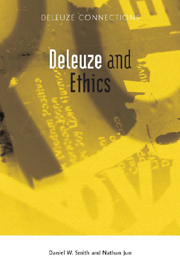Book contents
- Frontmatter
- Contents
- Acknowledgments
- Introduction
- 1 Whistle While You Work: Deleuze and the Spirit of Capitalism
- 2 The Ethics of the Event: Deleuze and Ethics without Aρχή
- 3 While Remaining on the Shore: Ethics in Deleuze's Encounter with Antonin Artaud
- 4 Responsive Becoming: Ethics between Deleuze and Feminism
- 5 Deleuze, Values, and Normativity
- 6 Ethics and the World without Others
- 7 Deleuze and the Question of Desire: Towards an Immanent Theory of Ethics
- 8 “Existing Not as a Subject But as a Work of Art”: The Task of Ethics or Aesthetics?
- 9 Deleuze, Ethics, Ethology, and Art
- 10 Never Too Late? On the Implications of Deleuze's Work on Death for a Deleuzian Moral Philosophy
- 11 Ethics between Particularity and Universality
- Notes on Contributors
- Index
9 - Deleuze, Ethics, Ethology, and Art
Published online by Cambridge University Press: 12 September 2012
- Frontmatter
- Contents
- Acknowledgments
- Introduction
- 1 Whistle While You Work: Deleuze and the Spirit of Capitalism
- 2 The Ethics of the Event: Deleuze and Ethics without Aρχή
- 3 While Remaining on the Shore: Ethics in Deleuze's Encounter with Antonin Artaud
- 4 Responsive Becoming: Ethics between Deleuze and Feminism
- 5 Deleuze, Values, and Normativity
- 6 Ethics and the World without Others
- 7 Deleuze and the Question of Desire: Towards an Immanent Theory of Ethics
- 8 “Existing Not as a Subject But as a Work of Art”: The Task of Ethics or Aesthetics?
- 9 Deleuze, Ethics, Ethology, and Art
- 10 Never Too Late? On the Implications of Deleuze's Work on Death for a Deleuzian Moral Philosophy
- 11 Ethics between Particularity and Universality
- Notes on Contributors
- Index
Summary
Ethics is that aspect of philosophy concerned with how to live. The Greek understanding of the word “ethikos,” involves “the state of being,” that which is manifest in the soul or mind. “Ethics” is etymologically linked to “ethology” through the Greek word root, “ethos.” The original meaning of “ethos” is “accustomed place,” or “habitat,” and by analogy it was quickly associated with “custom, habit.” It evolved however to be understood as the “character,” “disposition,” or core values of individuals or groups. Ethology, then, links ethos and “logos” (which might mean reason or expression); that is, it links disposition and understanding, in naming the scientific study of the behavior of animals within their natural habitats. A secondary meaning is the study of the formation of human ethos. Linking ethics and ethology, then, underlines how forming an understanding of one's disposition within one's habitat enables the proper living of one's life. The word “art,” is often associated with human relations to nature (often through ideas of the “representation” or “imitation” of nature, but also, importantly, with regard to “creation” understood to correspond analogically with natural creation). As such it is an understanding both of nature, and of dispositions within nature. Deleuze shows us not only how life is linked with nature, as ethics involves ethology, but how life and nature express dispositions as understandings, and how such processes of expression involve art, and its necessity. To put this another way: Deleuze shows us how art is necessarily concerned with the same fundamental question which concerns ethics and ethology: living.
- Type
- Chapter
- Information
- Deleuze and Ethics , pp. 154 - 170Publisher: Edinburgh University PressPrint publication year: 2011

